Business Ethics: Employee Obligations, Self-Interest, Whistleblowing
VerifiedAdded on 2023/06/15
|8
|2679
|417
Essay
AI Summary
This essay delves into the ethical responsibilities of employees in a business context, emphasizing the duty of loyalty to the firm and the importance of ethical conduct. It explores the concept of whistleblowing, highlighting its role in uncovering wrongdoings and misconduct within organizations, and discusses the motivations behind it, such as promoting positive change, protecting the public, and seeking compensation. The essay also evaluates the complexities of self-interest in ethical decision-making, presenting frameworks like utilitarianism, Kantian theory, and the ethics of care to guide employees in navigating moral conflicts. Ultimately, it concludes that employees have an obligation to report misconduct and that businesses should encourage whistleblowing to maintain ethical standards and protect the firm's interests. Desklib provides access to this essay along with a wealth of other study resources.
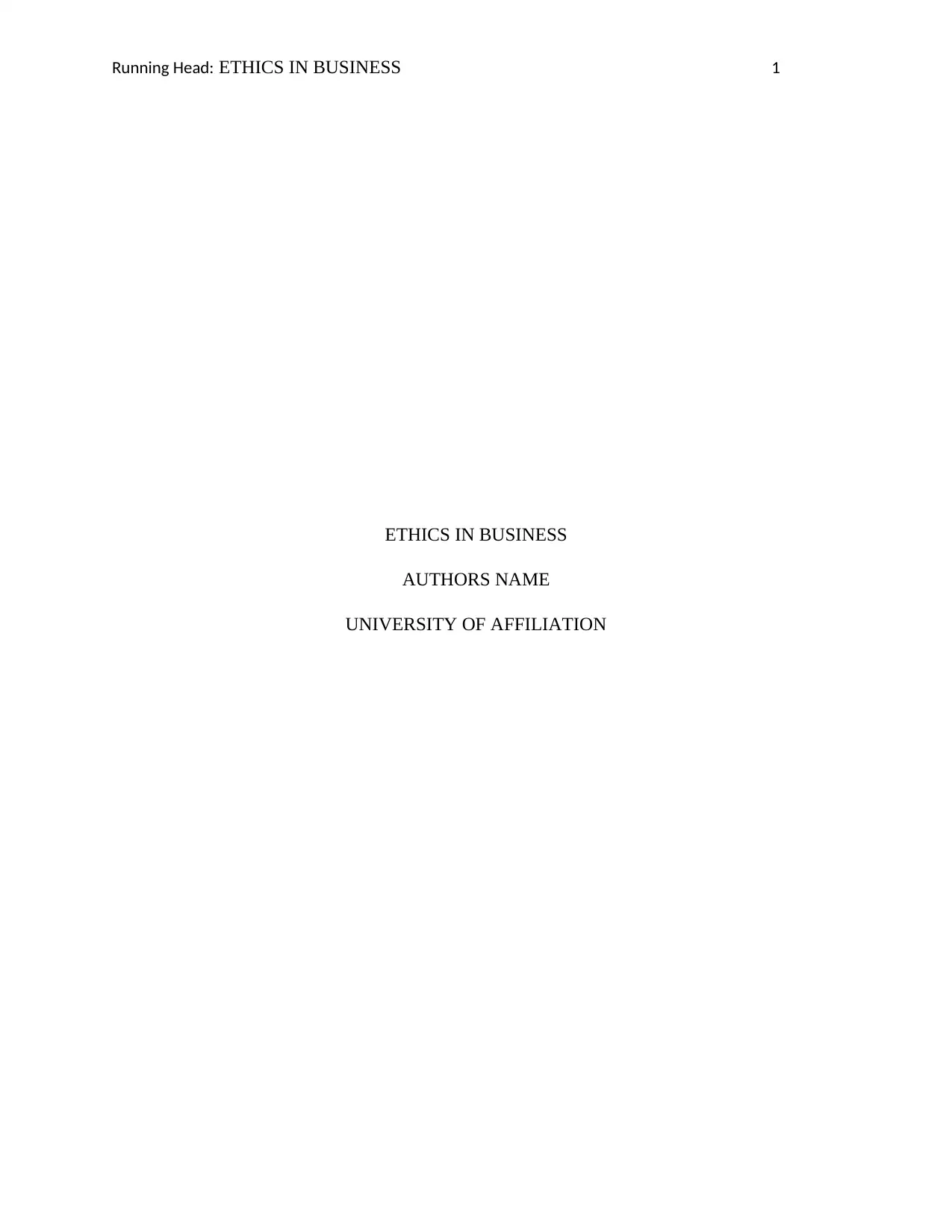
Running Head: ETHICS IN BUSINESS 1
ETHICS IN BUSINESS
AUTHORS NAME
UNIVERSITY OF AFFILIATION
ETHICS IN BUSINESS
AUTHORS NAME
UNIVERSITY OF AFFILIATION
Paraphrase This Document
Need a fresh take? Get an instant paraphrase of this document with our AI Paraphraser
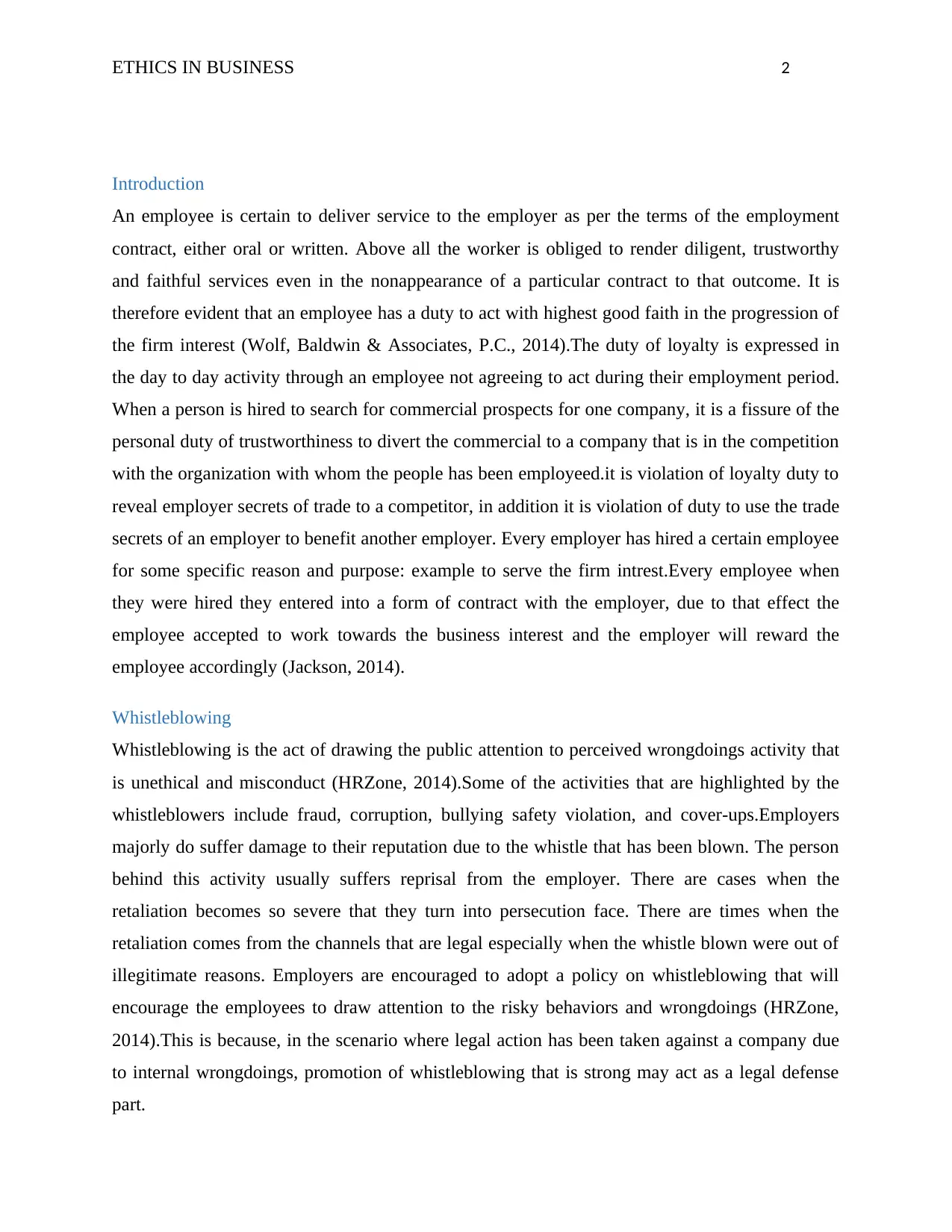
ETHICS IN BUSINESS 2
Introduction
An employee is certain to deliver service to the employer as per the terms of the employment
contract, either oral or written. Above all the worker is obliged to render diligent, trustworthy
and faithful services even in the nonappearance of a particular contract to that outcome. It is
therefore evident that an employee has a duty to act with highest good faith in the progression of
the firm interest (Wolf, Baldwin & Associates, P.C., 2014).The duty of loyalty is expressed in
the day to day activity through an employee not agreeing to act during their employment period.
When a person is hired to search for commercial prospects for one company, it is a fissure of the
personal duty of trustworthiness to divert the commercial to a company that is in the competition
with the organization with whom the people has been employeed.it is violation of loyalty duty to
reveal employer secrets of trade to a competitor, in addition it is violation of duty to use the trade
secrets of an employer to benefit another employer. Every employer has hired a certain employee
for some specific reason and purpose: example to serve the firm intrest.Every employee when
they were hired they entered into a form of contract with the employer, due to that effect the
employee accepted to work towards the business interest and the employer will reward the
employee accordingly (Jackson, 2014).
Whistleblowing
Whistleblowing is the act of drawing the public attention to perceived wrongdoings activity that
is unethical and misconduct (HRZone, 2014).Some of the activities that are highlighted by the
whistleblowers include fraud, corruption, bullying safety violation, and cover-ups.Employers
majorly do suffer damage to their reputation due to the whistle that has been blown. The person
behind this activity usually suffers reprisal from the employer. There are cases when the
retaliation becomes so severe that they turn into persecution face. There are times when the
retaliation comes from the channels that are legal especially when the whistle blown were out of
illegitimate reasons. Employers are encouraged to adopt a policy on whistleblowing that will
encourage the employees to draw attention to the risky behaviors and wrongdoings (HRZone,
2014).This is because, in the scenario where legal action has been taken against a company due
to internal wrongdoings, promotion of whistleblowing that is strong may act as a legal defense
part.
Introduction
An employee is certain to deliver service to the employer as per the terms of the employment
contract, either oral or written. Above all the worker is obliged to render diligent, trustworthy
and faithful services even in the nonappearance of a particular contract to that outcome. It is
therefore evident that an employee has a duty to act with highest good faith in the progression of
the firm interest (Wolf, Baldwin & Associates, P.C., 2014).The duty of loyalty is expressed in
the day to day activity through an employee not agreeing to act during their employment period.
When a person is hired to search for commercial prospects for one company, it is a fissure of the
personal duty of trustworthiness to divert the commercial to a company that is in the competition
with the organization with whom the people has been employeed.it is violation of loyalty duty to
reveal employer secrets of trade to a competitor, in addition it is violation of duty to use the trade
secrets of an employer to benefit another employer. Every employer has hired a certain employee
for some specific reason and purpose: example to serve the firm intrest.Every employee when
they were hired they entered into a form of contract with the employer, due to that effect the
employee accepted to work towards the business interest and the employer will reward the
employee accordingly (Jackson, 2014).
Whistleblowing
Whistleblowing is the act of drawing the public attention to perceived wrongdoings activity that
is unethical and misconduct (HRZone, 2014).Some of the activities that are highlighted by the
whistleblowers include fraud, corruption, bullying safety violation, and cover-ups.Employers
majorly do suffer damage to their reputation due to the whistle that has been blown. The person
behind this activity usually suffers reprisal from the employer. There are cases when the
retaliation becomes so severe that they turn into persecution face. There are times when the
retaliation comes from the channels that are legal especially when the whistle blown were out of
illegitimate reasons. Employers are encouraged to adopt a policy on whistleblowing that will
encourage the employees to draw attention to the risky behaviors and wrongdoings (HRZone,
2014).This is because, in the scenario where legal action has been taken against a company due
to internal wrongdoings, promotion of whistleblowing that is strong may act as a legal defense
part.
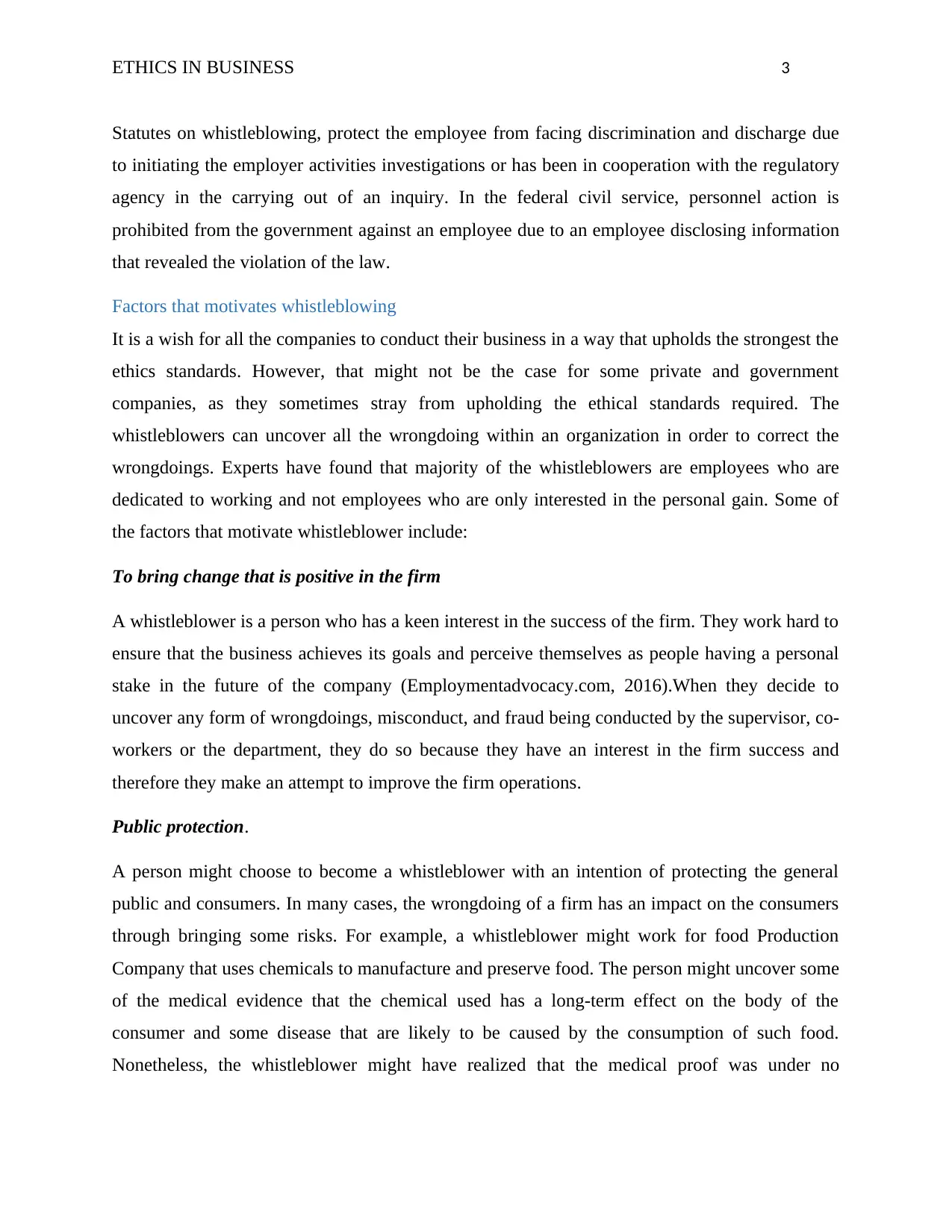
ETHICS IN BUSINESS 3
Statutes on whistleblowing, protect the employee from facing discrimination and discharge due
to initiating the employer activities investigations or has been in cooperation with the regulatory
agency in the carrying out of an inquiry. In the federal civil service, personnel action is
prohibited from the government against an employee due to an employee disclosing information
that revealed the violation of the law.
Factors that motivates whistleblowing
It is a wish for all the companies to conduct their business in a way that upholds the strongest the
ethics standards. However, that might not be the case for some private and government
companies, as they sometimes stray from upholding the ethical standards required. The
whistleblowers can uncover all the wrongdoing within an organization in order to correct the
wrongdoings. Experts have found that majority of the whistleblowers are employees who are
dedicated to working and not employees who are only interested in the personal gain. Some of
the factors that motivate whistleblower include:
To bring change that is positive in the firm
A whistleblower is a person who has a keen interest in the success of the firm. They work hard to
ensure that the business achieves its goals and perceive themselves as people having a personal
stake in the future of the company (Employmentadvocacy.com, 2016).When they decide to
uncover any form of wrongdoings, misconduct, and fraud being conducted by the supervisor, co-
workers or the department, they do so because they have an interest in the firm success and
therefore they make an attempt to improve the firm operations.
Public protection.
A person might choose to become a whistleblower with an intention of protecting the general
public and consumers. In many cases, the wrongdoing of a firm has an impact on the consumers
through bringing some risks. For example, a whistleblower might work for food Production
Company that uses chemicals to manufacture and preserve food. The person might uncover some
of the medical evidence that the chemical used has a long-term effect on the body of the
consumer and some disease that are likely to be caused by the consumption of such food.
Nonetheless, the whistleblower might have realized that the medical proof was under no
Statutes on whistleblowing, protect the employee from facing discrimination and discharge due
to initiating the employer activities investigations or has been in cooperation with the regulatory
agency in the carrying out of an inquiry. In the federal civil service, personnel action is
prohibited from the government against an employee due to an employee disclosing information
that revealed the violation of the law.
Factors that motivates whistleblowing
It is a wish for all the companies to conduct their business in a way that upholds the strongest the
ethics standards. However, that might not be the case for some private and government
companies, as they sometimes stray from upholding the ethical standards required. The
whistleblowers can uncover all the wrongdoing within an organization in order to correct the
wrongdoings. Experts have found that majority of the whistleblowers are employees who are
dedicated to working and not employees who are only interested in the personal gain. Some of
the factors that motivate whistleblower include:
To bring change that is positive in the firm
A whistleblower is a person who has a keen interest in the success of the firm. They work hard to
ensure that the business achieves its goals and perceive themselves as people having a personal
stake in the future of the company (Employmentadvocacy.com, 2016).When they decide to
uncover any form of wrongdoings, misconduct, and fraud being conducted by the supervisor, co-
workers or the department, they do so because they have an interest in the firm success and
therefore they make an attempt to improve the firm operations.
Public protection.
A person might choose to become a whistleblower with an intention of protecting the general
public and consumers. In many cases, the wrongdoing of a firm has an impact on the consumers
through bringing some risks. For example, a whistleblower might work for food Production
Company that uses chemicals to manufacture and preserve food. The person might uncover some
of the medical evidence that the chemical used has a long-term effect on the body of the
consumer and some disease that are likely to be caused by the consumption of such food.
Nonetheless, the whistleblower might have realized that the medical proof was under no
⊘ This is a preview!⊘
Do you want full access?
Subscribe today to unlock all pages.

Trusted by 1+ million students worldwide
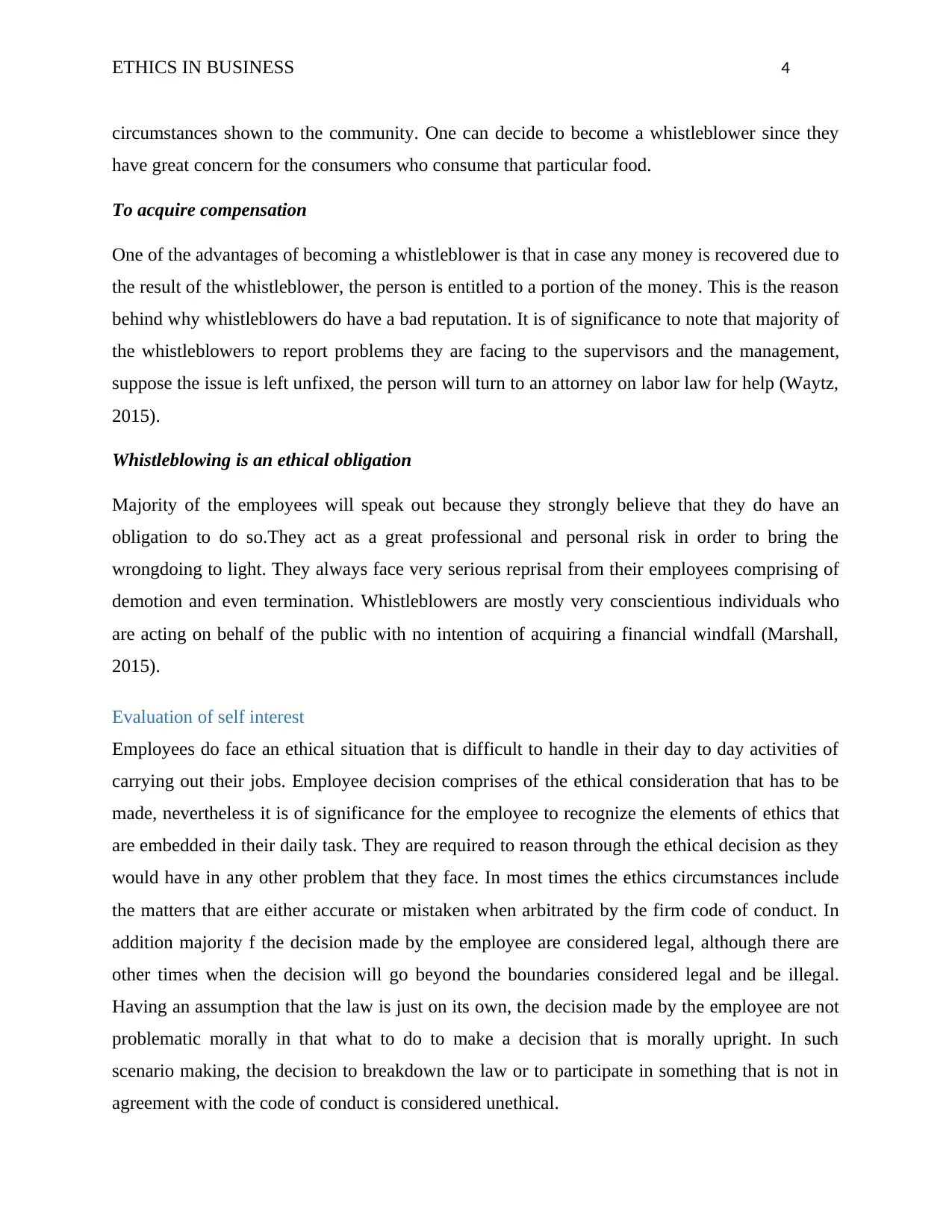
ETHICS IN BUSINESS 4
circumstances shown to the community. One can decide to become a whistleblower since they
have great concern for the consumers who consume that particular food.
To acquire compensation
One of the advantages of becoming a whistleblower is that in case any money is recovered due to
the result of the whistleblower, the person is entitled to a portion of the money. This is the reason
behind why whistleblowers do have a bad reputation. It is of significance to note that majority of
the whistleblowers to report problems they are facing to the supervisors and the management,
suppose the issue is left unfixed, the person will turn to an attorney on labor law for help (Waytz,
2015).
Whistleblowing is an ethical obligation
Majority of the employees will speak out because they strongly believe that they do have an
obligation to do so.They act as a great professional and personal risk in order to bring the
wrongdoing to light. They always face very serious reprisal from their employees comprising of
demotion and even termination. Whistleblowers are mostly very conscientious individuals who
are acting on behalf of the public with no intention of acquiring a financial windfall (Marshall,
2015).
Evaluation of self interest
Employees do face an ethical situation that is difficult to handle in their day to day activities of
carrying out their jobs. Employee decision comprises of the ethical consideration that has to be
made, nevertheless it is of significance for the employee to recognize the elements of ethics that
are embedded in their daily task. They are required to reason through the ethical decision as they
would have in any other problem that they face. In most times the ethics circumstances include
the matters that are either accurate or mistaken when arbitrated by the firm code of conduct. In
addition majority f the decision made by the employee are considered legal, although there are
other times when the decision will go beyond the boundaries considered legal and be illegal.
Having an assumption that the law is just on its own, the decision made by the employee are not
problematic morally in that what to do to make a decision that is morally upright. In such
scenario making, the decision to breakdown the law or to participate in something that is not in
agreement with the code of conduct is considered unethical.
circumstances shown to the community. One can decide to become a whistleblower since they
have great concern for the consumers who consume that particular food.
To acquire compensation
One of the advantages of becoming a whistleblower is that in case any money is recovered due to
the result of the whistleblower, the person is entitled to a portion of the money. This is the reason
behind why whistleblowers do have a bad reputation. It is of significance to note that majority of
the whistleblowers to report problems they are facing to the supervisors and the management,
suppose the issue is left unfixed, the person will turn to an attorney on labor law for help (Waytz,
2015).
Whistleblowing is an ethical obligation
Majority of the employees will speak out because they strongly believe that they do have an
obligation to do so.They act as a great professional and personal risk in order to bring the
wrongdoing to light. They always face very serious reprisal from their employees comprising of
demotion and even termination. Whistleblowers are mostly very conscientious individuals who
are acting on behalf of the public with no intention of acquiring a financial windfall (Marshall,
2015).
Evaluation of self interest
Employees do face an ethical situation that is difficult to handle in their day to day activities of
carrying out their jobs. Employee decision comprises of the ethical consideration that has to be
made, nevertheless it is of significance for the employee to recognize the elements of ethics that
are embedded in their daily task. They are required to reason through the ethical decision as they
would have in any other problem that they face. In most times the ethics circumstances include
the matters that are either accurate or mistaken when arbitrated by the firm code of conduct. In
addition majority f the decision made by the employee are considered legal, although there are
other times when the decision will go beyond the boundaries considered legal and be illegal.
Having an assumption that the law is just on its own, the decision made by the employee are not
problematic morally in that what to do to make a decision that is morally upright. In such
scenario making, the decision to breakdown the law or to participate in something that is not in
agreement with the code of conduct is considered unethical.
Paraphrase This Document
Need a fresh take? Get an instant paraphrase of this document with our AI Paraphraser
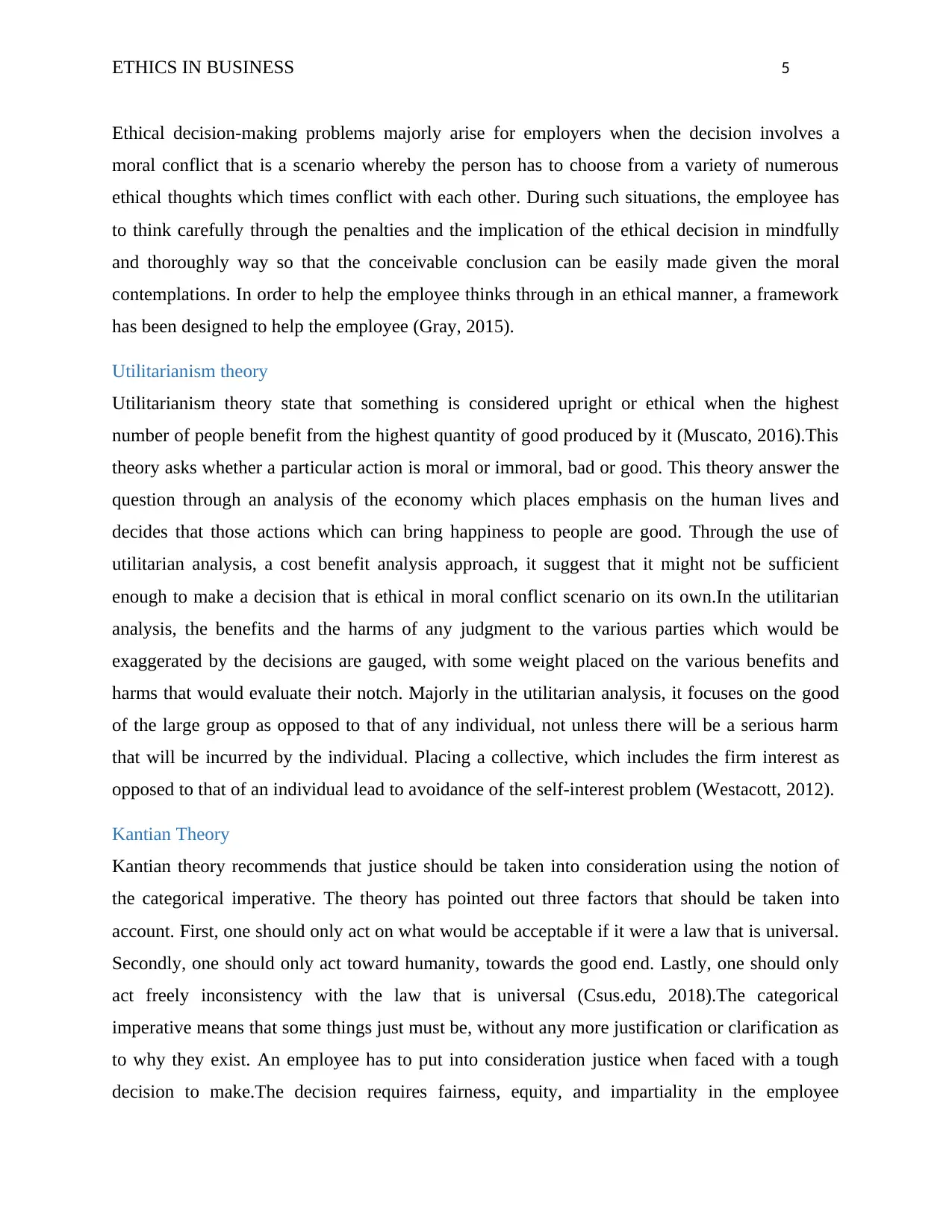
ETHICS IN BUSINESS 5
Ethical decision-making problems majorly arise for employers when the decision involves a
moral conflict that is a scenario whereby the person has to choose from a variety of numerous
ethical thoughts which times conflict with each other. During such situations, the employee has
to think carefully through the penalties and the implication of the ethical decision in mindfully
and thoroughly way so that the conceivable conclusion can be easily made given the moral
contemplations. In order to help the employee thinks through in an ethical manner, a framework
has been designed to help the employee (Gray, 2015).
Utilitarianism theory
Utilitarianism theory state that something is considered upright or ethical when the highest
number of people benefit from the highest quantity of good produced by it (Muscato, 2016).This
theory asks whether a particular action is moral or immoral, bad or good. This theory answer the
question through an analysis of the economy which places emphasis on the human lives and
decides that those actions which can bring happiness to people are good. Through the use of
utilitarian analysis, a cost benefit analysis approach, it suggest that it might not be sufficient
enough to make a decision that is ethical in moral conflict scenario on its own.In the utilitarian
analysis, the benefits and the harms of any judgment to the various parties which would be
exaggerated by the decisions are gauged, with some weight placed on the various benefits and
harms that would evaluate their notch. Majorly in the utilitarian analysis, it focuses on the good
of the large group as opposed to that of any individual, not unless there will be a serious harm
that will be incurred by the individual. Placing a collective, which includes the firm interest as
opposed to that of an individual lead to avoidance of the self-interest problem (Westacott, 2012).
Kantian Theory
Kantian theory recommends that justice should be taken into consideration using the notion of
the categorical imperative. The theory has pointed out three factors that should be taken into
account. First, one should only act on what would be acceptable if it were a law that is universal.
Secondly, one should only act toward humanity, towards the good end. Lastly, one should only
act freely inconsistency with the law that is universal (Csus.edu, 2018).The categorical
imperative means that some things just must be, without any more justification or clarification as
to why they exist. An employee has to put into consideration justice when faced with a tough
decision to make.The decision requires fairness, equity, and impartiality in the employee
Ethical decision-making problems majorly arise for employers when the decision involves a
moral conflict that is a scenario whereby the person has to choose from a variety of numerous
ethical thoughts which times conflict with each other. During such situations, the employee has
to think carefully through the penalties and the implication of the ethical decision in mindfully
and thoroughly way so that the conceivable conclusion can be easily made given the moral
contemplations. In order to help the employee thinks through in an ethical manner, a framework
has been designed to help the employee (Gray, 2015).
Utilitarianism theory
Utilitarianism theory state that something is considered upright or ethical when the highest
number of people benefit from the highest quantity of good produced by it (Muscato, 2016).This
theory asks whether a particular action is moral or immoral, bad or good. This theory answer the
question through an analysis of the economy which places emphasis on the human lives and
decides that those actions which can bring happiness to people are good. Through the use of
utilitarian analysis, a cost benefit analysis approach, it suggest that it might not be sufficient
enough to make a decision that is ethical in moral conflict scenario on its own.In the utilitarian
analysis, the benefits and the harms of any judgment to the various parties which would be
exaggerated by the decisions are gauged, with some weight placed on the various benefits and
harms that would evaluate their notch. Majorly in the utilitarian analysis, it focuses on the good
of the large group as opposed to that of any individual, not unless there will be a serious harm
that will be incurred by the individual. Placing a collective, which includes the firm interest as
opposed to that of an individual lead to avoidance of the self-interest problem (Westacott, 2012).
Kantian Theory
Kantian theory recommends that justice should be taken into consideration using the notion of
the categorical imperative. The theory has pointed out three factors that should be taken into
account. First, one should only act on what would be acceptable if it were a law that is universal.
Secondly, one should only act toward humanity, towards the good end. Lastly, one should only
act freely inconsistency with the law that is universal (Csus.edu, 2018).The categorical
imperative means that some things just must be, without any more justification or clarification as
to why they exist. An employee has to put into consideration justice when faced with a tough
decision to make.The decision requires fairness, equity, and impartiality in the employee
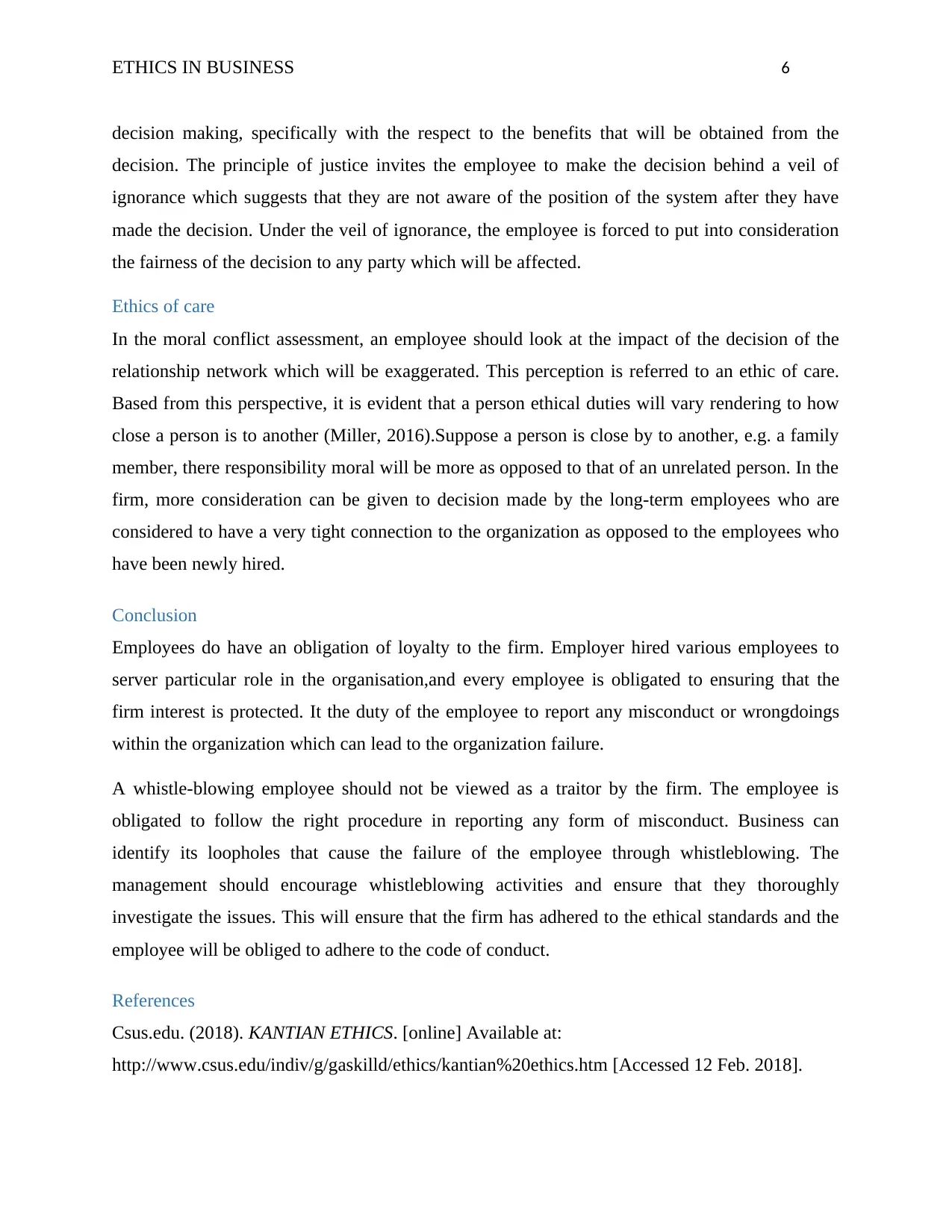
ETHICS IN BUSINESS 6
decision making, specifically with the respect to the benefits that will be obtained from the
decision. The principle of justice invites the employee to make the decision behind a veil of
ignorance which suggests that they are not aware of the position of the system after they have
made the decision. Under the veil of ignorance, the employee is forced to put into consideration
the fairness of the decision to any party which will be affected.
Ethics of care
In the moral conflict assessment, an employee should look at the impact of the decision of the
relationship network which will be exaggerated. This perception is referred to an ethic of care.
Based from this perspective, it is evident that a person ethical duties will vary rendering to how
close a person is to another (Miller, 2016).Suppose a person is close by to another, e.g. a family
member, there responsibility moral will be more as opposed to that of an unrelated person. In the
firm, more consideration can be given to decision made by the long-term employees who are
considered to have a very tight connection to the organization as opposed to the employees who
have been newly hired.
Conclusion
Employees do have an obligation of loyalty to the firm. Employer hired various employees to
server particular role in the organisation,and every employee is obligated to ensuring that the
firm interest is protected. It the duty of the employee to report any misconduct or wrongdoings
within the organization which can lead to the organization failure.
A whistle-blowing employee should not be viewed as a traitor by the firm. The employee is
obligated to follow the right procedure in reporting any form of misconduct. Business can
identify its loopholes that cause the failure of the employee through whistleblowing. The
management should encourage whistleblowing activities and ensure that they thoroughly
investigate the issues. This will ensure that the firm has adhered to the ethical standards and the
employee will be obliged to adhere to the code of conduct.
References
Csus.edu. (2018). KANTIAN ETHICS. [online] Available at:
http://www.csus.edu/indiv/g/gaskilld/ethics/kantian%20ethics.htm [Accessed 12 Feb. 2018].
decision making, specifically with the respect to the benefits that will be obtained from the
decision. The principle of justice invites the employee to make the decision behind a veil of
ignorance which suggests that they are not aware of the position of the system after they have
made the decision. Under the veil of ignorance, the employee is forced to put into consideration
the fairness of the decision to any party which will be affected.
Ethics of care
In the moral conflict assessment, an employee should look at the impact of the decision of the
relationship network which will be exaggerated. This perception is referred to an ethic of care.
Based from this perspective, it is evident that a person ethical duties will vary rendering to how
close a person is to another (Miller, 2016).Suppose a person is close by to another, e.g. a family
member, there responsibility moral will be more as opposed to that of an unrelated person. In the
firm, more consideration can be given to decision made by the long-term employees who are
considered to have a very tight connection to the organization as opposed to the employees who
have been newly hired.
Conclusion
Employees do have an obligation of loyalty to the firm. Employer hired various employees to
server particular role in the organisation,and every employee is obligated to ensuring that the
firm interest is protected. It the duty of the employee to report any misconduct or wrongdoings
within the organization which can lead to the organization failure.
A whistle-blowing employee should not be viewed as a traitor by the firm. The employee is
obligated to follow the right procedure in reporting any form of misconduct. Business can
identify its loopholes that cause the failure of the employee through whistleblowing. The
management should encourage whistleblowing activities and ensure that they thoroughly
investigate the issues. This will ensure that the firm has adhered to the ethical standards and the
employee will be obliged to adhere to the code of conduct.
References
Csus.edu. (2018). KANTIAN ETHICS. [online] Available at:
http://www.csus.edu/indiv/g/gaskilld/ethics/kantian%20ethics.htm [Accessed 12 Feb. 2018].
⊘ This is a preview!⊘
Do you want full access?
Subscribe today to unlock all pages.

Trusted by 1+ million students worldwide
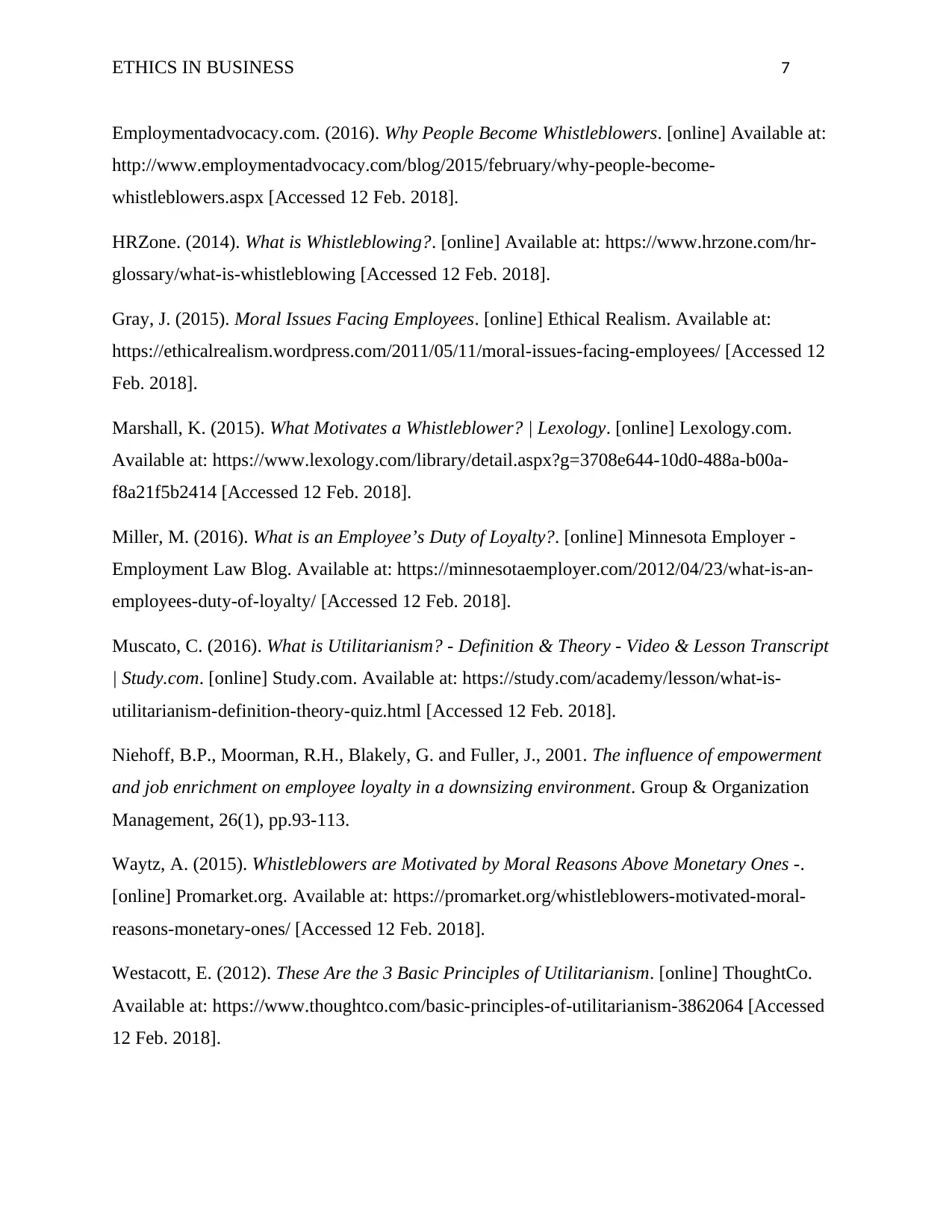
ETHICS IN BUSINESS 7
Employmentadvocacy.com. (2016). Why People Become Whistleblowers. [online] Available at:
http://www.employmentadvocacy.com/blog/2015/february/why-people-become-
whistleblowers.aspx [Accessed 12 Feb. 2018].
HRZone. (2014). What is Whistleblowing?. [online] Available at: https://www.hrzone.com/hr-
glossary/what-is-whistleblowing [Accessed 12 Feb. 2018].
Gray, J. (2015). Moral Issues Facing Employees. [online] Ethical Realism. Available at:
https://ethicalrealism.wordpress.com/2011/05/11/moral-issues-facing-employees/ [Accessed 12
Feb. 2018].
Marshall, K. (2015). What Motivates a Whistleblower? | Lexology. [online] Lexology.com.
Available at: https://www.lexology.com/library/detail.aspx?g=3708e644-10d0-488a-b00a-
f8a21f5b2414 [Accessed 12 Feb. 2018].
Miller, M. (2016). What is an Employee’s Duty of Loyalty?. [online] Minnesota Employer -
Employment Law Blog. Available at: https://minnesotaemployer.com/2012/04/23/what-is-an-
employees-duty-of-loyalty/ [Accessed 12 Feb. 2018].
Muscato, C. (2016). What is Utilitarianism? - Definition & Theory - Video & Lesson Transcript
| Study.com. [online] Study.com. Available at: https://study.com/academy/lesson/what-is-
utilitarianism-definition-theory-quiz.html [Accessed 12 Feb. 2018].
Niehoff, B.P., Moorman, R.H., Blakely, G. and Fuller, J., 2001. The influence of empowerment
and job enrichment on employee loyalty in a downsizing environment. Group & Organization
Management, 26(1), pp.93-113.
Waytz, A. (2015). Whistleblowers are Motivated by Moral Reasons Above Monetary Ones -.
[online] Promarket.org. Available at: https://promarket.org/whistleblowers-motivated-moral-
reasons-monetary-ones/ [Accessed 12 Feb. 2018].
Westacott, E. (2012). These Are the 3 Basic Principles of Utilitarianism. [online] ThoughtCo.
Available at: https://www.thoughtco.com/basic-principles-of-utilitarianism-3862064 [Accessed
12 Feb. 2018].
Employmentadvocacy.com. (2016). Why People Become Whistleblowers. [online] Available at:
http://www.employmentadvocacy.com/blog/2015/february/why-people-become-
whistleblowers.aspx [Accessed 12 Feb. 2018].
HRZone. (2014). What is Whistleblowing?. [online] Available at: https://www.hrzone.com/hr-
glossary/what-is-whistleblowing [Accessed 12 Feb. 2018].
Gray, J. (2015). Moral Issues Facing Employees. [online] Ethical Realism. Available at:
https://ethicalrealism.wordpress.com/2011/05/11/moral-issues-facing-employees/ [Accessed 12
Feb. 2018].
Marshall, K. (2015). What Motivates a Whistleblower? | Lexology. [online] Lexology.com.
Available at: https://www.lexology.com/library/detail.aspx?g=3708e644-10d0-488a-b00a-
f8a21f5b2414 [Accessed 12 Feb. 2018].
Miller, M. (2016). What is an Employee’s Duty of Loyalty?. [online] Minnesota Employer -
Employment Law Blog. Available at: https://minnesotaemployer.com/2012/04/23/what-is-an-
employees-duty-of-loyalty/ [Accessed 12 Feb. 2018].
Muscato, C. (2016). What is Utilitarianism? - Definition & Theory - Video & Lesson Transcript
| Study.com. [online] Study.com. Available at: https://study.com/academy/lesson/what-is-
utilitarianism-definition-theory-quiz.html [Accessed 12 Feb. 2018].
Niehoff, B.P., Moorman, R.H., Blakely, G. and Fuller, J., 2001. The influence of empowerment
and job enrichment on employee loyalty in a downsizing environment. Group & Organization
Management, 26(1), pp.93-113.
Waytz, A. (2015). Whistleblowers are Motivated by Moral Reasons Above Monetary Ones -.
[online] Promarket.org. Available at: https://promarket.org/whistleblowers-motivated-moral-
reasons-monetary-ones/ [Accessed 12 Feb. 2018].
Westacott, E. (2012). These Are the 3 Basic Principles of Utilitarianism. [online] ThoughtCo.
Available at: https://www.thoughtco.com/basic-principles-of-utilitarianism-3862064 [Accessed
12 Feb. 2018].
Paraphrase This Document
Need a fresh take? Get an instant paraphrase of this document with our AI Paraphraser
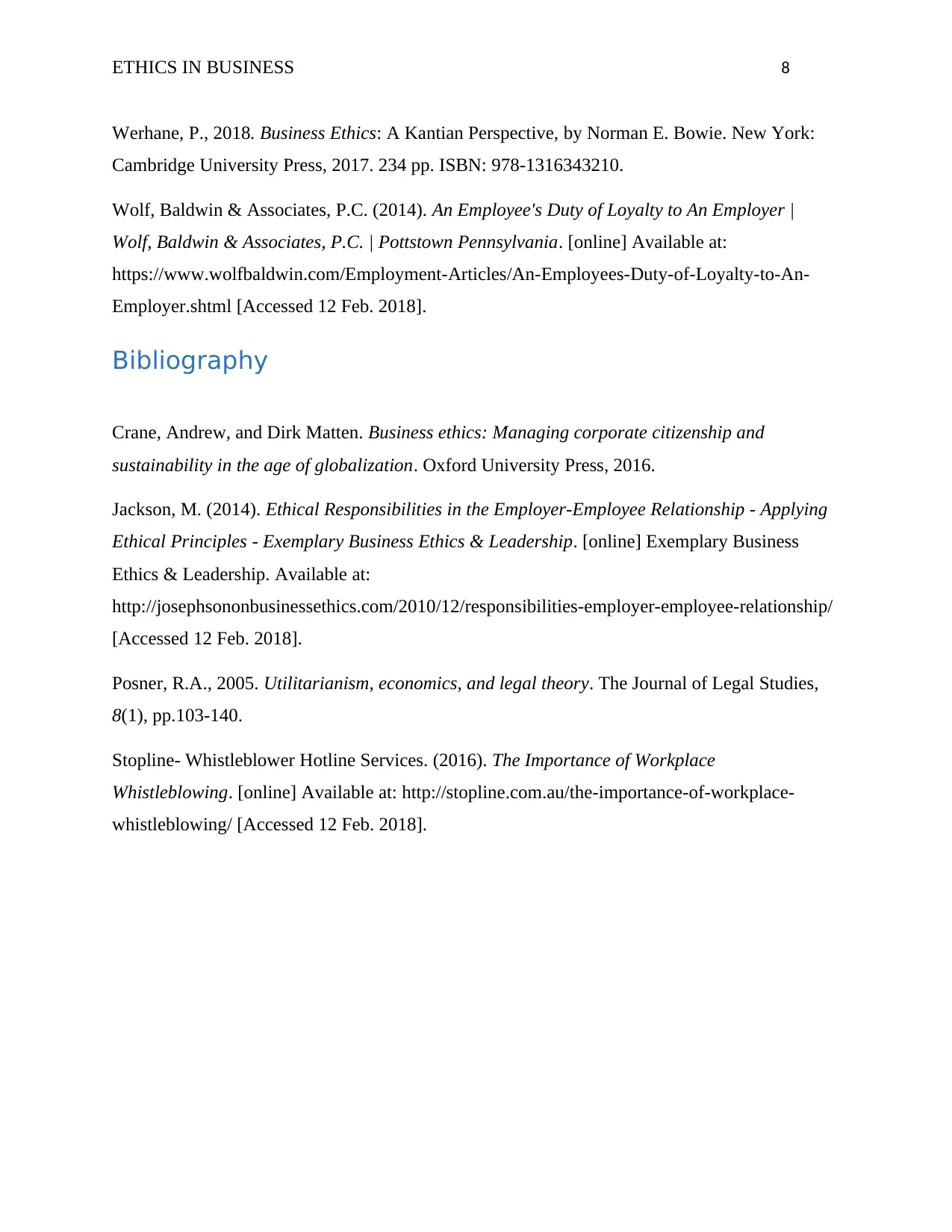
ETHICS IN BUSINESS 8
Werhane, P., 2018. Business Ethics: A Kantian Perspective, by Norman E. Bowie. New York:
Cambridge University Press, 2017. 234 pp. ISBN: 978-1316343210.
Wolf, Baldwin & Associates, P.C. (2014). An Employee's Duty of Loyalty to An Employer |
Wolf, Baldwin & Associates, P.C. | Pottstown Pennsylvania. [online] Available at:
https://www.wolfbaldwin.com/Employment-Articles/An-Employees-Duty-of-Loyalty-to-An-
Employer.shtml [Accessed 12 Feb. 2018].
Bibliography
Crane, Andrew, and Dirk Matten. Business ethics: Managing corporate citizenship and
sustainability in the age of globalization. Oxford University Press, 2016.
Jackson, M. (2014). Ethical Responsibilities in the Employer-Employee Relationship - Applying
Ethical Principles - Exemplary Business Ethics & Leadership. [online] Exemplary Business
Ethics & Leadership. Available at:
http://josephsononbusinessethics.com/2010/12/responsibilities-employer-employee-relationship/
[Accessed 12 Feb. 2018].
Posner, R.A., 2005. Utilitarianism, economics, and legal theory. The Journal of Legal Studies,
8(1), pp.103-140.
Stopline- Whistleblower Hotline Services. (2016). The Importance of Workplace
Whistleblowing. [online] Available at: http://stopline.com.au/the-importance-of-workplace-
whistleblowing/ [Accessed 12 Feb. 2018].
Werhane, P., 2018. Business Ethics: A Kantian Perspective, by Norman E. Bowie. New York:
Cambridge University Press, 2017. 234 pp. ISBN: 978-1316343210.
Wolf, Baldwin & Associates, P.C. (2014). An Employee's Duty of Loyalty to An Employer |
Wolf, Baldwin & Associates, P.C. | Pottstown Pennsylvania. [online] Available at:
https://www.wolfbaldwin.com/Employment-Articles/An-Employees-Duty-of-Loyalty-to-An-
Employer.shtml [Accessed 12 Feb. 2018].
Bibliography
Crane, Andrew, and Dirk Matten. Business ethics: Managing corporate citizenship and
sustainability in the age of globalization. Oxford University Press, 2016.
Jackson, M. (2014). Ethical Responsibilities in the Employer-Employee Relationship - Applying
Ethical Principles - Exemplary Business Ethics & Leadership. [online] Exemplary Business
Ethics & Leadership. Available at:
http://josephsononbusinessethics.com/2010/12/responsibilities-employer-employee-relationship/
[Accessed 12 Feb. 2018].
Posner, R.A., 2005. Utilitarianism, economics, and legal theory. The Journal of Legal Studies,
8(1), pp.103-140.
Stopline- Whistleblower Hotline Services. (2016). The Importance of Workplace
Whistleblowing. [online] Available at: http://stopline.com.au/the-importance-of-workplace-
whistleblowing/ [Accessed 12 Feb. 2018].
1 out of 8
Related Documents
Your All-in-One AI-Powered Toolkit for Academic Success.
+13062052269
info@desklib.com
Available 24*7 on WhatsApp / Email
![[object Object]](/_next/static/media/star-bottom.7253800d.svg)
Unlock your academic potential
Copyright © 2020–2026 A2Z Services. All Rights Reserved. Developed and managed by ZUCOL.





